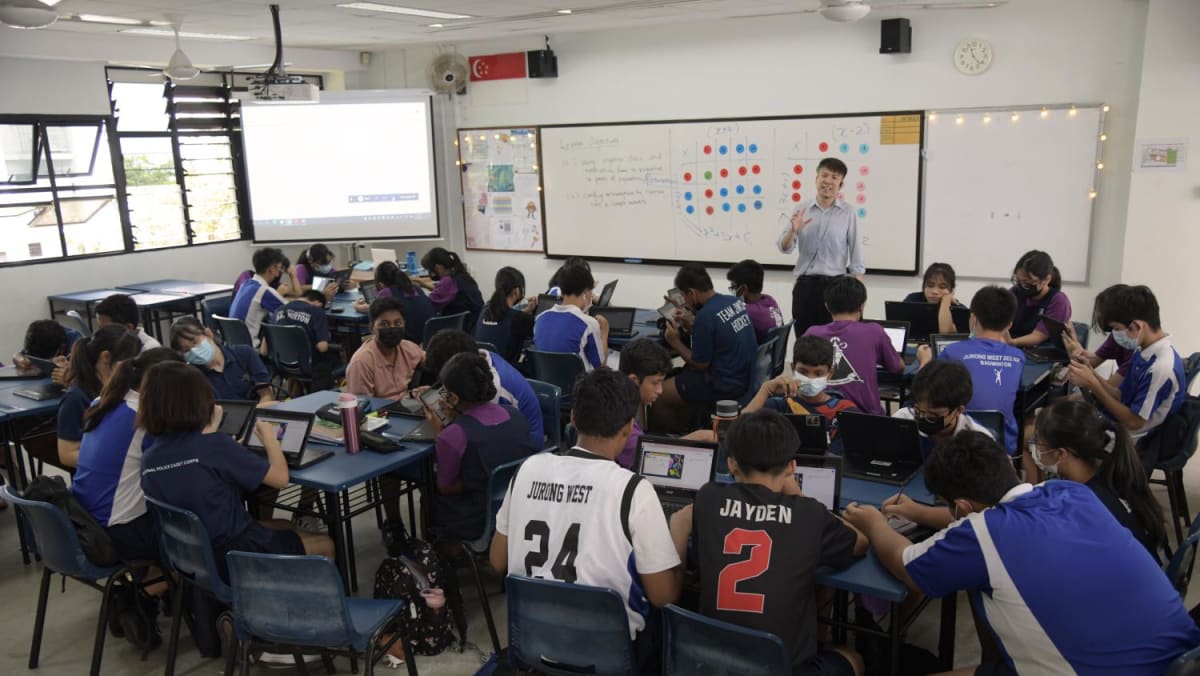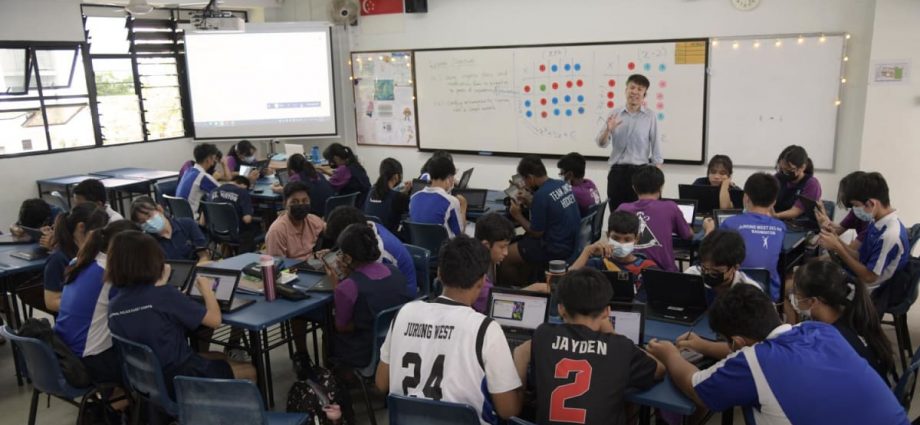
GETTING STUDENTS TO MIX
After the bell rang at 11.40am, signalling a new period, students from 2 Excellence filed out of the room and made their way to another classroom for music lessons. The form class reunited to practise familiar tunes like Despacito on the ukulele.
When streaming is removed from 2024, all students in schools that accept different bands of students will see mixed form classes, Education Minister Chan Chun Sing announced in 2022.
In 2023, about 90 schools, or more than two-thirds of secondary schools, have implemented full subject-based banding.
It takes some effort to get the students to open up to their new classmates in their subject classes at the start of the year, because they are more familiar with the friends that they have gone through orientation with in their form classes, said PE and geography teacher P Vinoth.
“When I tried to make the lessons interesting, energetic, it’s a bit difficult, because of this awkwardness between students,” he added.
“So I have to intentionally plan a lot of bonding activities, group activities, mini competitions between the students for them to get them to know one another before the class actually becomes lively.”
When they come into class in their teaching groups, students don’t even know where to sit, said Ms Ng.
Group work and intentional seating arrangements to ensure that students from different classes are seated together helps, she added.
To help the students bond and work together, she helped her class set a common goal – to pass and move on to Secondary 2 together. During group work, she also changes up the groupings often so that the students get to know each other.
“Initially, you start to see that they are very uncomfortable sitting with each other because they don’t really know each other, but subsequently you have to establish ground rules with them, and get them to actually participate in setting up the ground rules with you.”
When they switch to a new class, N(A) students who are offered a subject at the Express level will also need to know which class to go to, said Ms Yasmin Hussein, the Year Head for lower secondary students.
“So of course, there’s some operational and logistics that we need to do, so during the first two weeks of school, all the subject teachers will fetch the students from their class and bring them to the other class,” she added.
N(A) students taking an Express-level subject are also aware that they are taking the subject at a higher level, said Ms Yasmin, who also teaches Malay language.
“So we come together and we discuss to have this commonality that we are here studying the same subject, so you need to shape your mindset and understand that it’s offered to you because you are just as capable,” she added.
“I think currently, at this stage, we don’t have that sort of stigmatisation in class. In fact, I told them it’s not about achieving top grades in my class, I want to see progress,” said Ms Yasmin, adding that she urges students to support and help each other.
Under the full subject-based banding model, students no longer differentiate each other according to their form classes, said Mr Vinoth.
“They start to mix and socialise with students from other form classes as well. So at the end of the year, usually it feels like another form class by itself because they are really supportive of each other.”
Ahmad Yasin Jofri, 14, from 2 Passion described taking classes under the full subject-based banding model as a “very eye-opening experience” where he gets to meet people from all sorts of backgrounds.
To accommodate the mixed form classes and having students from different classes in core subject classes, the school switched to a two-week timetable, which means students have a different timetable in odd and even weeks of the school year.
While he found the system confusing at first, he eventually got used to it. His classmates also remind each other to pack their bags for the correct timetable each week.
Ahmad also enjoys having a mixed form class, describing it as “quite fun”. He had heard from his seniors that in previous years, students from higher streams would have certain perceptions of students from the lower streams, and found that quite sad.
“I feel like the fact that we’re all in a mixed form class is a very good experience, because just because you’re from another stream doesn’t mean you cannot talk to other people,” he added.
“At our school, when it comes to having fun or mixing with one another, we don’t really care about what stream you’re in, whether you’re in Express, N(A) or N(T), we’re all just friends when we’re playing football at the field.”

